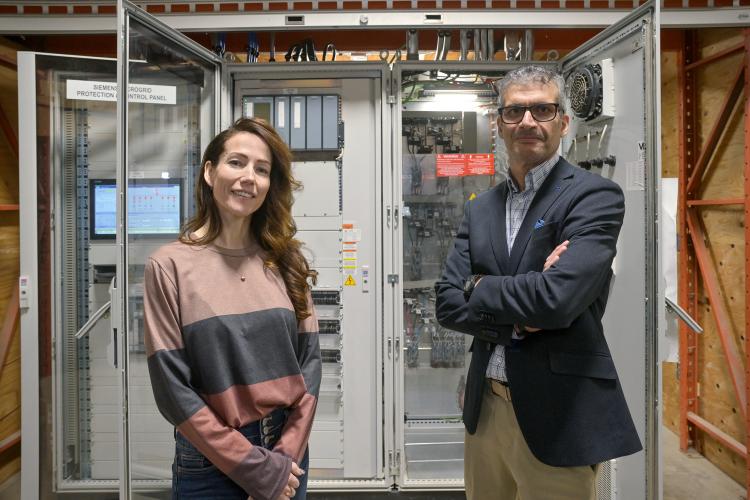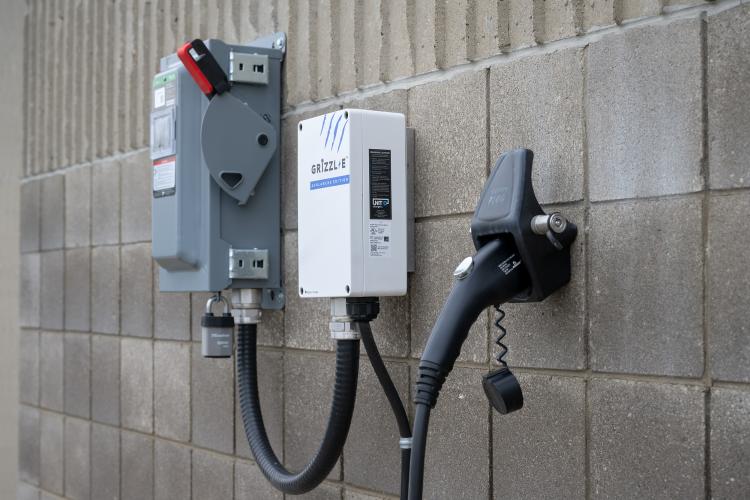A first-of-its-kind energy project at the University of Regina is now fully operational, offering a glimpse into the future of how communities in Saskatchewan and beyond could be powered.

Lisa Vindevoghel, lab instructor in Electronic Systems Engineering, and Dr. Ifran Al-Anbagi, director of the Microgrid Living Lab and associate professor in the Faculty of Engineering and Applied Science, standing in front of the microgrid's control centre. (Photo by U of R Photography)
Developed by a research team at the University, the Microgrid Living Lab is ready to enable groundbreaking research, hands-on learning, and industry collaboration.
What is a microgrid?
A microgrid is a self-contained energy system that can generate, store, and distribute electricity locally using clean energy sources such as solar panels, wind, and hydro power. It can operate independently or in tandem with the main electrical grid improving energy reliability and reducing greenhouse gas emissions.
Unlike traditional power grids, which rely on centralized infrastructure and long-distance transmission, microgrids offer a more flexible, resilient, and sustainable approach to energy management. They are especially valuable in remote or hard-to-reach areas and during extreme weather events when the main grid is vulnerable.
The Microgrid Living Lab at U of R
The U of R's microgrid is the first-of-its-kind in Saskatchewan and one of only a few in Western Canada. It marks a significant step in the University's multi-year journey toward becoming a carbon-neutral campus.
The Microgrid Living Lab, which was funded by Prairies Economic Development Canada, is more than a research facility, it's a sandbox for energy innovation. Equipped with renewable energy sources, digital controls, and real energy loads, the lab allows researchers, students, and industry partners to emulate and test how microgrid systems perform in real-world conditions.
"This lab gives us a controlled, flexible space to test new technologies, analyse how energy systems interact, and solve real problems related to grid design and resilience," says Dr. Ifran Al-Anbagi, director of the Microgrid Living Lab and associate professor in the Faculty of Engineering and Applied Science. "It's a critical platform for research, innovation, and collaboration as we work toward a cleaner energy future."
The University of Regina invites businesses, researchers, and energy experts to partner with the Microgrid Living Lab. Whether developing new technologies, testing ideas, or training the next generation of energy leaders, the lab offers space, tools, and expertise to support meaningful progress.
"As demand for clean, reliable energy grows, the Microgrid Living Lab represents a powerful step forward," says Al-Anbagi.
Innovation Week in Saskatchewan is an annual celebration of the people and ideas shaping the province's future.

An EV charger outside of the U of R. Powered by the microgrid, the charger will soon offer free charging for the University of Regina community. (Photo by U of R Photography)
"Dr. Al-Anbagi and his team's innovative, forward-thinking research and clean-energy solutions are going to benefit the future of this province, and beyond," says Dr. Chris Yost, Vice-President (Research), University of Regina. "We're pleased to be showcasing the Microgrid Living Lab along with our other world-class research facilities during the Innovation Week tours."










